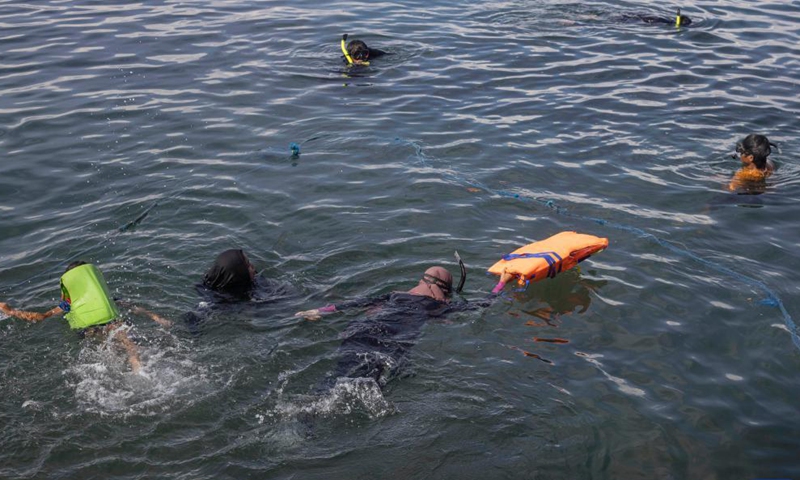WWF calls for treaty on plastic
Urgent efforts needed to combat pollution on ocean

Volunteers swim to pick up plastic wastes during the Marine Debris Festival, held by the local community as a campaign to save the beach from plastics pollution, in Poliwali Mandar district, West Sulawesi, Indonesia, Oct. 3, 2021. (Photo by Yusuf Wahil/Xinhua)
Plastic has infiltrated all parts of the ocean and is now found "in the smallest plankton up to the largest whale," wildlife group WWF said on Tuesday, calling for urgent efforts to create an international treaty on plastics.Tiny fragments of plastic have reached even the most remote and seemingly pristine regions of the planet: It peppers Arctic sea ice and has been found inside fish in the deepest recesses of the ocean, the Mariana Trench.
There is no international agreement in place to address the problem, although delegates meeting in Nairobi for a United Nations environment meeting in February are expected to launch talks on a worldwide plastics treaty.
WWF sought to bolster the case for action in its latest report, which synthesizes more than 2,000 separate scientific studies on the impacts of plastic pollution on the oceans, biodiversity and marine ecosystems.
The report acknowledged that there is currently insufficient evidence to estimate the potential repercussions on humans.
But it found that the fossil fuel-derived substance "has reached every part of the ocean, from the sea surface to the deep ocean floor, from the poles to coastlines of the most remote islands and is detectable in the smallest plankton up to the largest whale."
According to some estimates, between 19 and 23 million tons of plastic waste is washed into the world's waterways every year, the WWF report said.
This is largely from single-use plastics, which still constitute more than 60 percent of marine pollution, although more and more countries are acting to ban their use.
"In many places [we are] reaching some kind of saturation point for marine ecosystems, where we're approaching levels that pose a significant threat," said Eirik Lindebjerg, Global Plastics Policy Manager at WWF.
In some places there is a risk of "ecosystem collapse," he said. Many people have seen images of seabirds choking on plastic straws or turtles wrapped in discarded fishing nets, but he said the danger is across the entire marine food web.
In one 2021 study, 386 fish species were found to have ingested plastic, out of 555 tested.
Once in the water, the plastic begins to degrade, becoming smaller and smaller until it is a "nanoplastic," invisible to the naked eye.
So even if all plastic pollution stopped completely, the volume of microplastics in the oceans could still double by 2050.
AFP
